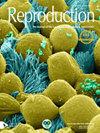揭开生殖长寿的秘密:社会性昆虫的潜力
IF 3.7
3区 生物学
Q1 DEVELOPMENTAL BIOLOGY
引用次数: 0
摘要
社会性昆虫为生殖长寿模型提供了一个非同寻常的机会,因为它们挑战了其他模式生物的传统衰老和生殖模式。它们的雌虫同时具有长寿和高繁殖力的特性,了解这些特性是如何同时出现的,可能会带来对人类健康有重要影响的发现。本文章由计算机程序翻译,如有差异,请以英文原文为准。
Unlocking the Secrets of Reproductive Longevity: The Potential of Social Insects
Social insects present an extraordinary opportunity as models for reproductive longevity because they challenge the conventional patterns of aging and reproduction seen in other model organisms. Their queens are simultaneously long-lived and highly fecund, and understanding how these traits co-occur may lead to discoveries with important implications for human health.
求助全文
通过发布文献求助,成功后即可免费获取论文全文。
去求助
来源期刊

Reproduction
生物-发育生物学
CiteScore
7.40
自引率
2.60%
发文量
199
审稿时长
4-8 weeks
期刊介绍:
Reproduction is the official journal of the Society of Reproduction and Fertility (SRF). It was formed in 2001 when the Society merged its two journals, the Journal of Reproduction and Fertility and Reviews of Reproduction.
Reproduction publishes original research articles and topical reviews on the subject of reproductive and developmental biology, and reproductive medicine. The journal will consider publication of high-quality meta-analyses; these should be submitted to the research papers category. The journal considers studies in humans and all animal species, and will publish clinical studies if they advance our understanding of the underlying causes and/or mechanisms of disease.
Scientific excellence and broad interest to our readership are the most important criteria during the peer review process. The journal publishes articles that make a clear advance in the field, whether of mechanistic, descriptive or technical focus. Articles that substantiate new or controversial reports are welcomed if they are noteworthy and advance the field. Topics include, but are not limited to, reproductive immunology, reproductive toxicology, stem cells, environmental effects on reproductive potential and health (eg obesity), extracellular vesicles, fertility preservation and epigenetic effects on reproductive and developmental processes.
 求助内容:
求助内容: 应助结果提醒方式:
应助结果提醒方式:


